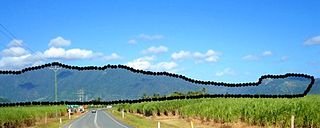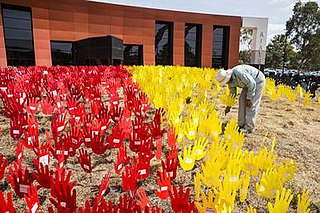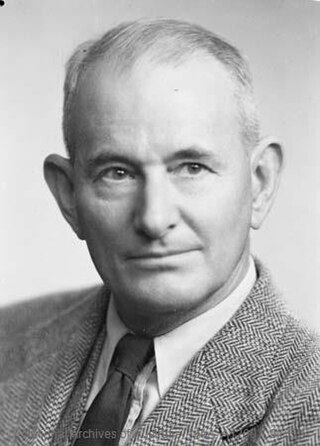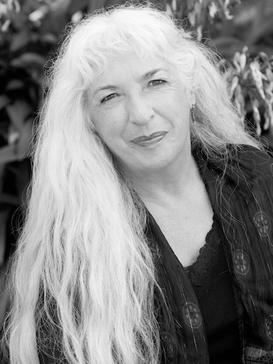
Australian Aboriginal religion and mythology is the sacred spirituality represented in the stories performed by Aboriginal Australians within each of the language groups across Australia in their ceremonies. Aboriginal spirituality includes the Dreamtime, songlines, and Aboriginal oral literature.

The Australian Institute of Aboriginal and Torres Strait Islander Studies (AIATSIS), established as the Australian Institute of Aboriginal Studies (AIAS) in 1964, is an independent Australian Government statutory authority. It is a collecting, publishing, and research institute and is considered to be Australia's premier resource for information about the cultures and societies of Aboriginal and Torres Strait Islander peoples.

Norman Barnett Tindale AO was an Australian anthropologist, archaeologist, entomologist and ethnologist.

Donald Finlay Fergusson Thomson OBE was an Australian anthropologist and ornithologist. he is known for his studies of and friendship with the Pintupi and Yolngu peoples, and for his intervention in the Caledon Bay crisis.

Marcia Lynne Langton is an Aboriginal Australian writer and academic. As of 2022 she is the Redmond Barry Distinguished Professor at the Melbourne School of Population and Global Health, University of Melbourne. Langton is known for her activism in the Indigenous rights arena.
William Edward Hanley Stanner CMG, often cited as W.E.H. Stanner, was an Australian anthropologist who worked extensively with Indigenous Australians. Stanner had a varied career that also included journalism in the 1930s, military service in World War II, and political advice on colonial policy in Africa and the South Pacific in the post-war period.

The Native Title Act 1993(Cth) is a law passed by the Australian Parliament, the purpose of which is "to provide a national system for the recognition and protection of native title and for its co-existence with the national land management system". The Act was passed by the Keating government following the High Court's decision in Mabo v Queensland (No 2) (1992). The Act commenced operation on 1 January 1994.

Charles Pearcy Mountford OBE was an Australian anthropologist and photographer. He is known for his pioneering work on Indigenous Australians and his depictions and descriptions of their art. He also led the American-Australian Scientific Expedition to Arnhem Land.
Indigenous Australian self-determination, also known as Aboriginal Australian self-determination, is the power relating to self-governance by Aboriginal and Torres Strait Islander peoples in Australia. It is the right of Aboriginal and Torres Strait Islander peoples to determine their own political status and pursue their own economic, social and cultural interests. Self-determination asserts that Aboriginal and Torres Strait Islander peoples should direct and implement Aboriginal and Torres Strait Islander policy formulation and provision of services. Self-determination encompasses both Aboriginal land rights and self-governance, and may also be supported by a treaty between a government and an Indigenous group in Australia.
The Wik peoples are an Indigenous Australian group of people from an extensive zone on western Cape York Peninsula in northern Queensland, speaking several different languages. They are from the coastal flood plains bounding the Gulf of Carpentaria lying between Pormpuraaw and Weipa, and inland the forested country drained by the Archer, Kendall and Holroyd rivers. The first ethnographic study of the Wik people was undertaken by the Queensland born anthropologist Ursula McConnel. Her fieldwork focused on groups gathered into the Archer River Mission at what is now known as Aurukun.
Diane Robin Bell is an Australian anthropologist, author, and social justice advocate. Her work focuses on the Aboriginal people of Australia, Indigenous land rights, human rights, Indigenous religions, violence against women, and on environmental issues.

Roger Llewellyn Dunmore Cribb was an Australian archaeologist and anthropologist who specialised in documenting and modelling spatial patterns and social organisation of nomadic peoples. He is noted for conducting early fieldwork amongst the nomadic pastoralists of Anatolia, Turkey; writing a book on the archaeology of these nomads; pioneering Australian archaeology and anthropologies' use of geographical information systems, plus genealogical software; and conducting later fieldwork documenting the cultural landscapes of the Aboriginal peoples of Cape York Peninsula.
The American-Australian Scientific Expedition to Arnhem Land remains one of the most significant, most ambitious and least understood expeditions. Commenced in February 1948, it was one of the largest scientific expeditions to have taken place in Australia and was conducted by a team of Australian and American researchers and support staff.

Ursula Hope McConnel (1888–1957) was a Queensland anthropologist and ethnographer best remembered for her work with, and the records she made of, the Wik Mungkan people of Cape York Peninsula.
Professor Jon Charles Altman is a social scientist with a disciplinary focus on anthropology and economics. He is an emeritus professor of the Australian National University currently affiliated to the Regulatory Institutions Network (RegNet), College of Asia and the Pacific, ANU. He was the founding director of the Centre for Aboriginal Economic Policy Research (CAEPR) at the Australian National University and then a research professor there until 2014 when he retired. He is a Fellow of the Academy of the Social Sciences in Australia and an Honorary Fellow of the Royal Society of New Zealand. From 2008 to 2013 he was an Australian Research Council Australian Professorial Fellow. In late 2015 Altman moved to Melbourne to take up an appointment from 1 February 2016 as research professor at the Alfred Deakin Institute for Citizenship and Globalization at Deakin University.
The Injilarija people were an Aboriginal Australian people who lived south of the Gulf of Carpentaria in Queensland, east of the Waanyi, south of the Nguburinji and west of the Mingginda peoples. They are considered extinct.
David McKnight was a Canadian-British anthropologist and ethnographer who specialized in the anthropology of Australian Aboriginal people, with particular regard to the tribes of the Cape York Peninsula. He conducted over 20 field trips among Aboriginal people in Australia from 1965 to 1999.
Bruce Rigsby was an American-Australian anthropologist specializing in the languages and ethnography of native peoples on both continents. He was professor emeritus at Queensland University, and a member of both the Australian Anthropological Society and the American Anthropological Association.
Lissant Mary Bolton is an Australian anthropologist and the Keeper of the Department of Africa, Oceania and the Americas at the British Museum. She is particularly known for her work on Vanuatu, textiles, and museums and indigenous communities.

Deborah Bird Rose (1946-2018) was an Australian-based ethnographer of Aboriginal peoples; plus, in her lifetime, an increasingly ecological, multi-species ethnographer and leader in multidisciplinary ethnographic research
Her research since the 1980s has focused on entwined social and ecological justice, based on long-term fieldwork with Aboriginal people in Australia. Her approach has drawn on elements of anthropology, history, philosophy, cultural studies, religious studies, and animal studies and has led to innovative understandings of ethnographic and ecological knowledge, most recently in the new area of multispecies ethnography










